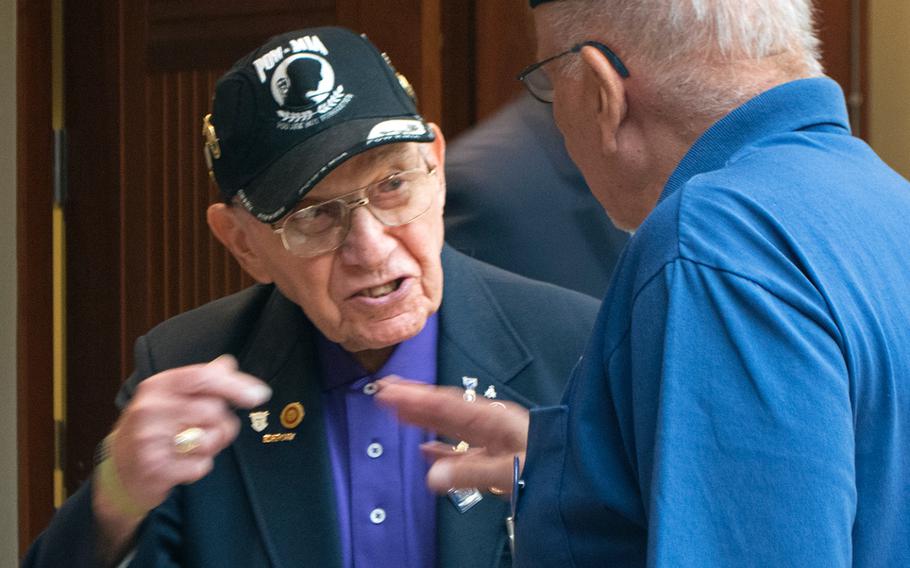
Jerry Wolf, left, speaks with Richard Rinaldo, both Purple Heart recipients, before the start of the Purple Heart ceremony at Mount Vernon on Aug. 7, 2015, about his time as a prisoner of war in a German camp during World War II. (Meredith Tibbetts/Stars and Stripes)
MOUNT VERNON, Va. — Staff Sgt. Jerry Wolf had already flown 25 missions with the U.S. Army Air Corps when he boarded his B-17 bomber as a top turret gunner. It was May 28, 1944, only a few days before the Normandy invasion. But while his fellow Allied troops moved across Europe toward Berlin, Wolf would spend the next year in a German POW camp.
“Diarrhea and dysentery ran rampant," said Wolf, whose plane was shot down on that 26th mission. "No running water, not hot water, no water in the barracks, no showers. We called it 'God’s shower' when it rained.”
Wolf was one of the veterans in attendance Friday at Mount Vernon, George Washington's Virginia home, for National Purple Heart Day ceremonies. Washington established the original Purple Heart award in 1782.
“The Purple Heart, or back then the Badge of Military Merit, was the first military recognition that was ever provided by any military organization or any nation to honor the soldier, the enlisted man," said said retired U.S. Army Col. Gordon Sumner. "All the other awards were always for officers.”
Sumner is the commander of the Greater Washington, D.C. chapter of the Military Order of the Purple Heart, and is also the president of the non-profit Veterans Moving Forward, a charity that provides service dogs to veterans with physical and mental health challenges.
“The original three [medals that] were awarded by Gen. Washington during the Revolutionary War were really for merit," Sumner said. "Didn’t have anything to do with being wounded.”
In 1932, General Douglas MacArthur redesigned the Purple Heart to the familiar award it is today. It was backdated for World War I events.
The Purple Heart is now "for those who were killed or wounded in combat, or killed or wounded in any recognized terrorist attack," Sumner said.
Marine Corps Sgt. Maj. Bryan Battaglia, the senior enlisted advisor to the Chairman of the Joint Chiefs of Staff, spoke emotionally during Friday's ceremony of the men and women who have paid the ultimate sacrifice.
“Like hundreds of thousands of fighting men and women," Battaglia said, "my participatory role in this global war on terror is only a very small contribution, and in many cases a few small sacrifices compared to our fellow comrades in arms who returned severely injured, or those who even lie now in rank and file across our hallowed grounds in our cemeteries. They, ladies and gentlemen, have displayed the ultimate sacrifice to our country. They, too, wear this Purple Heart.
“Let’s not forget we have men and women still in the trenches today doing our nation’s bidding. While the Purple Heart represents courage, bravery, patriotism to the men and women who wear it, it also symbolizes resilience for the families who are there to serve as the backbone and springboard for the wounded warrior on the road to recovery,” Battaglia added.
Resilience was also an important factor for Wolf, who was awarded a Purple Heart for injuries he sustained when his plane — among 32 bombers and seven fighters lost that day — went down.
The Brooklyn, N.Y. native was a Jewish prisoner of war in a German camp, but he said he was treated the same as the other American POWs.
When Wolf was first brought into the camp, the German interrogator repeatedly asked him his name, rank and serial number. He refused until the German said he could write a postcard home if he provided the information.
“Conditions were bad," he said — notably the lack of food. "The German ration was a piece of bread [and] butter about an inch and a half wide. You got that early. Had some tea. Lunch was soup. I think [it was] chicken they used, [but it] didn’t taste like chicken soup. Then you got four potatoes that went into a stew.”
Each prisoner was supposed to get additional food from the Red Cross, but the Germans ate the majority of it, he said.
“How we survived, we don’t know.”
tibbetts.meredith@stripes.com Twitter: @mjtibbs